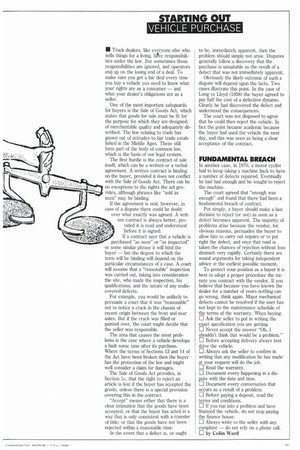WITHIN YOUR RIGHTS
Page 60

Page 61

If you've noticed an error in this article please click here to report it so we can fix it.
No one is allowed to sell faulty merchandise by law, and that includes truck dealers. But Commercial Motor receives plenty of calls from operators who claim they have been caught out. Anyone starting out in road haulage should know their rights ...
• Truck dealers, like everyone else who sells things for a living, Are responsibilities under the law. But sometimes those responsibilities are ignored, and operators end up on the losing end of a deal. To make sure you get a fair deal every time you buy a vehicle you need to know what your rights are as a consumer — and what your dealer's obligations are as a seller.
One of the most important safeguards for buyers is the Sale of Goods Act, which states that goods for sale must be fit for the purpose for which they are designed; of merchantable quality and adequately described. The law relating to trade has grown out of attitudes to fair trade established in the Middle Ages. These still form part of the body of common law, which is the basis of our legal system.
The first hurdle is the contract of sale itself, which can be a written or a verbal agreement. A written contract is binding on the buyer, provided it does not conflict with the Sale of Goods Act. There can he no exceptions to the rights the act provides, although phrases like "sold as seen" may be binding.
If the agreement is oral, however, in case of a dispute there could be doubt over what exactly was agreed. A writ ten contract is always better, provided it is read and understood before it is signed.
If a contract says that a vehicle is purchased "as seen" or "as inspected" or some similar phrase it will bind the buyer — but the degree to which the term will be binding will depend on the particular circumstances of a case. A court will assume that a "reasonable" inspection was carried out, taking into consideration the site, who made the inspection, his qualifications, and the nature of any undiscovered defects.
For example, you would be unlikely to persuade a court that it was "reasonable" not to notice a crack in the chassis of recent origin between the front and rear axles. But if the crack was filled or painted over, the court might decide that the seller was responsible.
The area that causes the most problems is the case where a vehicle develops a fault some time after its purchase. Where the terms of Sections 13 and 14 of the Act have been broken then the buyer has the protection of the law and might well consider a claim for damages.
The Sale of Goods Act provides, in Section lc, that the right to reject an article is lost if the buyer has accepted the goods, unless there is a special provision covering this in the contract.
"Accept" means either that there is a clear intimation that the goods have been accepted; or that the buyer has acted in a way that is only consistent with a transfer of title; or that the goods have not been rejected within a reasonable time.
In the event that a defect is, or ought to be, immediately apparent, then the problem should simply not arise. Disputes generally follow a discovery that the purchase is unsuitable as the result of a defect that was not immediately apparent.
Obviously the likely outcome of such a dispute will depend upon the facts. Two cases illustrate this point. In the case of Long vs Lloyd (1958) the buyer agreed to pay half the cost of a defective dynamo. Clearly he had discovered the defect and understood the consequences.
The court was not disposed to agree that he could then reject the vehicle. In fact the point became academic because the buyer had used the vehicle the next day, and this was seen as being a clear acceptance of the contract.
FUNDAMENTAL BREACH
In another case, in 1970, a motor cyclist had to keep taking a machine back to have a number of defects repaired. Eventually he had had enough and he sought to reject the machine.
The court agreed that "enough was enough" and found that there had been a fundamental breach of contract.
Put simply, a buyer should make a fast decision to reject (or not) as soon as a defect becomes apparent. The majority of problems arise because the vendor, for obvious reasons, persuades the buyer to allow him to carry out repairs or to put right the defect, and once that road is taken the chances of rejection without loss diminish very rapidly. Certainly there are sound arguments for taking independent advice at the earliest possible moment.
To protect your position as a buyer it is best to adopt a proper procedure the minute you contract with the vendor. If you believe that because you have known the dealer for a number of years nothing can go wrong, think again. Major mechanical defects cannot be resolved if the user has not kept to the maintenance schedule of the terms of the warranty. When buying: LI Ask the seller to put in writing the exact specification you are getting. LI Never accept the answer "Oh, I shouldn't think that would be a problem." LI Before accepting delivery always test drive the vehicle.
111 Always ask the seller to confirm in writing that any modification he has made at your request will do the job.
LI Read the warranty.
El Document every happening in a dispute with the date and time.
LJ Document every conversation that occurs as a result of a problem.
0 Before paying a deposit, read the terms and conditions.
LI If you run into a problem and have financed the vehicle, do not stop paying the finance house.
El Always write to the seller with any complaint — do not rely on a phone call. LI by Colin Ward


























































































































